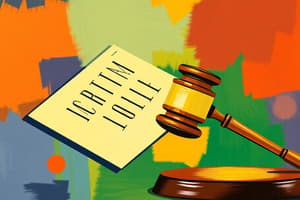Podcast
Questions and Answers
What is one of the primary benefits of effective risk management?
What is one of the primary benefits of effective risk management?
- It enables organizations to minimize losses. (correct)
- It eliminates the need for strategic planning.
- It removes all uncertainties.
- It guarantees profit maximization.
Which of the following is NOT a financial risk mentioned in the content?
Which of the following is NOT a financial risk mentioned in the content?
- Asset losses
- Bribery and corruption (correct)
- Poor financial management
- Debt and interest rate
What is an essential action that organizations should take regarding risk management?
What is an essential action that organizations should take regarding risk management?
- Assign responsibilities among team members. (correct)
- Create strict action plans that cannot be altered.
- Maintain rigidity in approach.
- Avoid communication about priorities.
According to the content, how should organizations view the concept of risk?
According to the content, how should organizations view the concept of risk?
Which of the following practices is suggested for effective risk management?
Which of the following practices is suggested for effective risk management?
What is the first step in the risk management process?
What is the first step in the risk management process?
Which of the following is NOT classified as a type of risk?
Which of the following is NOT classified as a type of risk?
After identifying potential risks, what is the next step in the process?
After identifying potential risks, what is the next step in the process?
What is the ultimate goal of treating identified risks?
What is the ultimate goal of treating identified risks?
Which statement is true regarding risk management success?
Which statement is true regarding risk management success?
What can be a potential consequence of not implementing a treatment plan?
What can be a potential consequence of not implementing a treatment plan?
Which of the following is a common challenge associated with risks?
Which of the following is a common challenge associated with risks?
What mindset does Bear Grylls suggest regarding risks?
What mindset does Bear Grylls suggest regarding risks?
What is an essential first step in implementing Enterprise Risk Management (ERM) practices?
What is an essential first step in implementing Enterprise Risk Management (ERM) practices?
What type of risks does strategic risk management focus on?
What type of risks does strategic risk management focus on?
What is a primary goal of risk management in finance?
What is a primary goal of risk management in finance?
How should risks be monitored in a risk management framework?
How should risks be monitored in a risk management framework?
Which of the following is NOT considered a strategic risk?
Which of the following is NOT considered a strategic risk?
What does a proactive approach to risk management entail?
What does a proactive approach to risk management entail?
Which risk is categorized as operational rather than strategic?
Which risk is categorized as operational rather than strategic?
Why is ongoing monitoring of risk mitigation plans essential?
Why is ongoing monitoring of risk mitigation plans essential?
Flashcards are hidden until you start studying
Study Notes
Risk Management Process
- First step involves identifying risks present in business operations such as legal, environmental, market, and regulatory risks.
- Identifying a broad range of potential risks enhances preparedness and response strategies.
- Common risks include fire damage, slip and fall accidents, vehicle accidents, and product-related losses.
Analyzing the Risk
- Once risks are identified, a thorough analysis is essential to assess the probability and impact of each risk.
- This helps focus on high-priority risks that require immediate attention and treatment plans.
Treatment of Risk
- Developing a treatment plan involves solving or reducing identified risks to mitigate their impact on operations.
- Proper resource allocation for risk treatment is crucial for maintaining project momentum.
- Adopt a proactive approach to risk management for effective treatment rather than waiting for risks to materialize.
Monitoring the Risk
- Ongoing communication with the team and stakeholders facilitates transparency in monitoring potential risks.
- Continuous evaluation ensures the effectiveness of mitigation plans, keeping the organization alert to changes in risk status.
Types of Risks
Strategic Risks
- Demand shortfall, customer retention, integration issues, pricing pressure, regulation needs, and R&D challenges.
- Losses from joint ventures or partner relationships.
Operational Risks
- Risks include cost overruns, supply chain disruptions, employee-related issues (fraud, bribery), and regulatory compliance.
Hazard Risks
- Macroeconomic changes, political instability, legal challenges, terrorism, and natural disasters pose significant hazards.
Financial Risks
- Key concerns encompass debt levels, interest rates, poor financial management, asset losses, and accounting dilemmas.
Enterprise Risk Management (ERM)
- ERM is a comprehensive strategy for organizations to identify, assess, and manage risks affecting operation and goals.
- Implementing ERM involves defining risk philosophy, creating actionable plans, prioritizing communication, assigning responsibilities, maintaining flexibility, and leveraging technology.
Importance of Risk Management
- Essential for calculating uncertainties and preparing organizations for unexpected events.
- Aids in minimizing potential losses while maximizing opportunities.
- Emphasized by quote: "The biggest risk is not taking any risk" (Robert Kiyosaki).
Studying That Suits You
Use AI to generate personalized quizzes and flashcards to suit your learning preferences.




